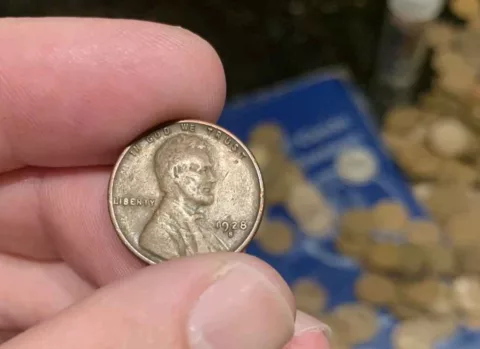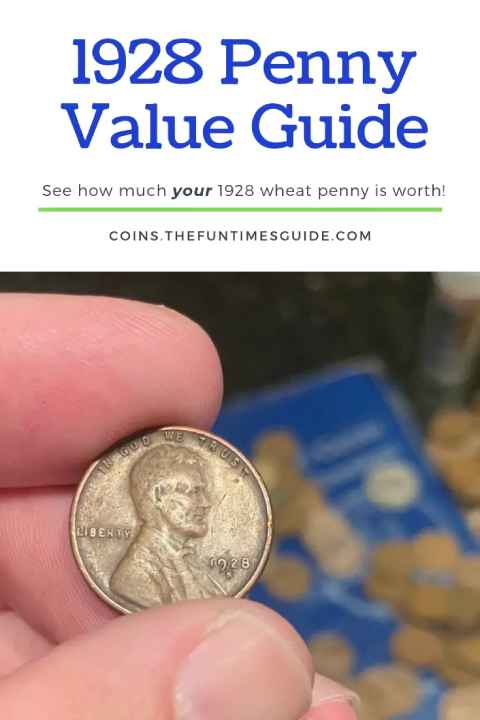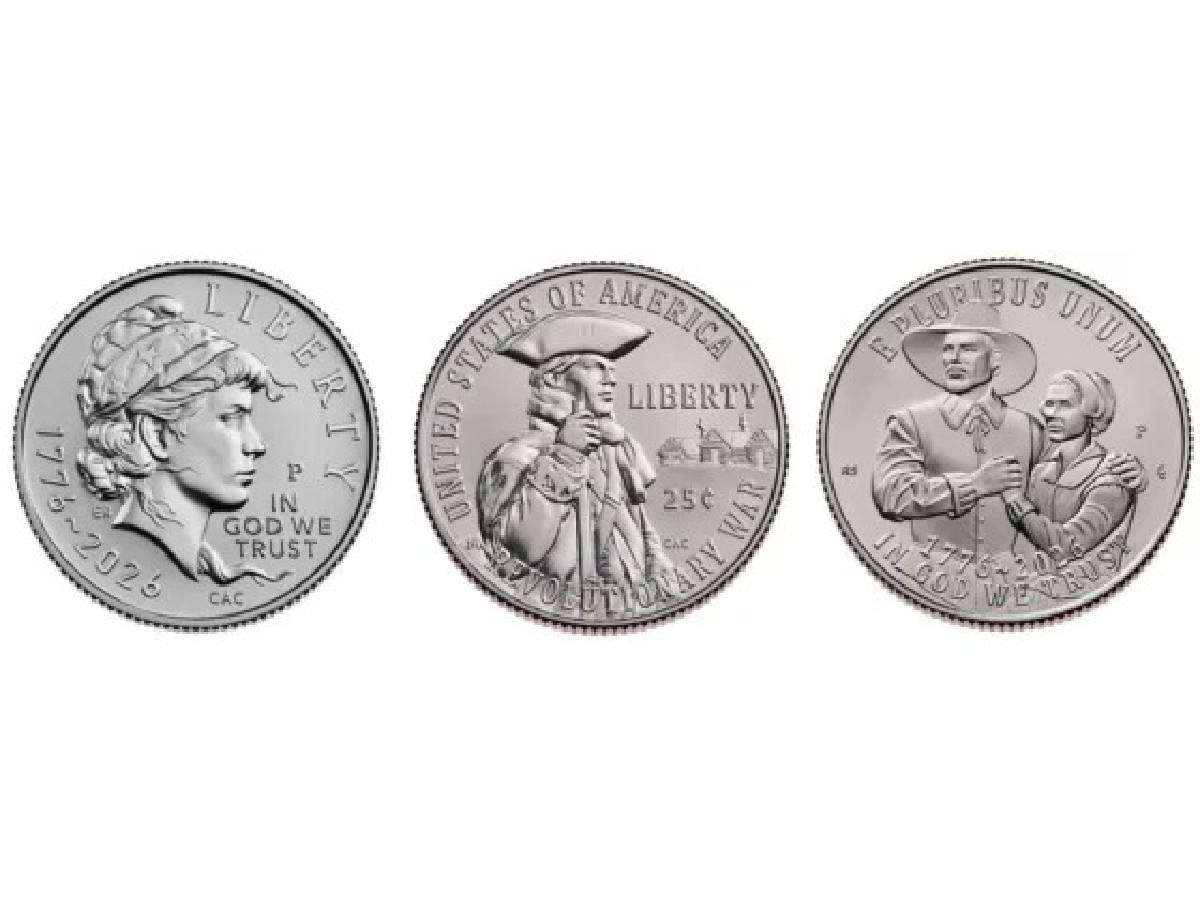
Have a 1928 penny and want to know its value?
Today, I’m going to talk about these old 1929 wheat pennies and how much they’re worth.
I’ll show you what to look for on these Lincoln wheat cents — so you can find the most valuable pennies in pocket change!
The Ultimate 1928 Penny Value Guide
A 1928 wheat penny can be worth anywhere from a few cents to a few thousand dollars.
I know that’s not exactly the specific answer you’re looking for — so, I’m going to help you determine exactly how much your 1928 wheat penny is worth.
First, you need to know the factors that determine the value of your 1928 wheat cent:
- Its mintmark, indicating where the coin was made
- The condition of the coin, including its overall state of preservation
- Whether or not it has any errors or varieties, many of which are rare
Now, let’s break down 1928 Lincoln wheat penny values by mintmark and condition…
1928 Penny Value With No Mintmark
The 1928 wheat penny with no mintmark was made at the Philadelphia Mint. It turns up from time to time in circulation — so be sure to check your loose change regularly! A total of 134,116,000 of these pennies were made.
Since this 1928 Lincoln cent does not have a mintmark, you won’t find any letter at all under the date on the obverse (heads side) of the coin.
If you’ve found a 1928 wheat penny with no mintmark in your pocket change or in an old coin collection, chances are that old Lincoln cent will have a lot of wear. It will look flat, show little detail, and probably be a dark brown in color. 1928 pennies with a lot of wear like this are worth between 10 and 50 cents. That’s 10 to 50 times more than face value… so yes, it’s definitely worth looking through your pocket change for these pennies!
TIP: Whatever you do, don’t clean your coins, no matter how dirty they look! Cleaning a coin will not increase its value. Instead… it will actually slash its value by 50% or more.
What about nicer-looking 1928 no-mintmark pennies? Maybe you’ve found one that’s worn, but the details in Lincoln’s beard are crisp and the wheat stalks look clear. A lightly worn 1928 penny with no mintmark is worth $1.50 to $3.
Finally, there are uncirculated 1928 pennies — ones that have never been used as money. These are relatively scarce. Typically, an uncirculated 1928 wheat penny is worth $10 to $25. However, many are worth more. For example, one 1928 uncirculated penny with no mintmark graded MS-67+ Red by Professional Coin Grading Service (PCGS) and approved by Certified Acceptance Corporation (CAC) as being a premium example for its grade sold for $9,000!
1928-D Penny Value
The 1928-D penny, from the Denver mint, is much scarcer than its Philadelphia-minted sibling. It is relatively scarce, as well.
You’ll spot a 1928-D penny by looking under the date for a “D” mintmark. With a mintage of 31,170,000, this coin is a bit challenging to find — especially in uncirculated condition.
Heavily worn examples of the 1928-D penny are the least valuable. They’re worth around 50 cents to $2 each.
1928-D pennies with very light wear are worth closer to $5 to $15 apiece.
Finally, there are the uncirculated examples. These are very difficult to find — you’ve really got to be looking for these at a coin shop or in an old coin collection. You won’t find a uncirculated 1928-D penny in circulation. These are worth about $40 and up. How far “up”?… One 1928-D penny that was graded MS-66 Red by PCGS sold at auction in 2005 for $10,300!
1928-S Penny Value
The 1928-S penny from the San Francisco mint is the scarcest issue from that year — with only 17,266,000 struck. Most 1928-S pennies are found in well-worn condition and these are worth between 75 cents and $2.
Lightly worn specimens of the 1928-S penny are much harder to come by and have a value of $7 to $15 apiece.
Finally, uncirculated 1928-S pennies are quite valuable and are worth around $75+.
The most valuable 1928-S penny ever sold is an MS-66 Red specimen certified by PCGS and sold at auction in 2006 for an outstanding $36,800!
IMPORTANT: What Is The Grade Of Your 1928 Penny?
To determine the true value of your 1928 penny, you first need to know what condition (or grade) your coin is in.
Grab a coin magnifier and a copy of the U.S. Coin Grading Standards book. Then, watch this video to see how to grade coins yourself at home:
A List Of Rare 1928 Wheat Penny Errors
Some of the most valuable 1928 wheat pennies aren’t the ones that were made correctly but those that weren’t!
These are known as error coins. Many are worth a little bit of money. Some are worth a lot.
Which 1928 error pennies should you be looking for?
Here’s a list of the most well-known 1928 wheat penny errors…
1928 Pennies With Doubled Die Errors
You’ve probably heard about doubled dies. A doubled die is a coin struck by a coin die that was impressed twice by a hub at slightly different angles.
Some doubled dies are minor. Others are more dramatic. Not all are worth the big bucks — such as the famous 1955 doubled die penny. Most doubled dies are actually rather insignificant and don’t garner much interest. But many are worth a nice chunk of change!
There are a few different, relatively minor 1928 pennies with doubled dies. One shows some minor doubling in the date. Others show the doubling in Lincoln’s eyelid. Some 1928-D pennies exhibit doubling on the reverse (tails side) in the wheat stalks and in the inscription E PLURIBUS UNUM.
While 1928 doubled die pennies don’t trade very often, similar pieces trade for between $5 and $20.
1928 Pennies WIth Off-Center Errors
Off-center error pennies are rather common as a class. The more off-center they are, the rarer and more valuable they are.
Minor off-center pennies (those that are less than 5% off center) really aren’t worth much, if anything, over face value. However, as the strike gets to 5% or more off center, the value goes up. They are even more valuable if the strike is way off, as long as the date is still fully visible.
As for 1928 off-center pennies, those that are 10% to 20% off-center can snag $100 or more. Pieces 50% or more off-center are worth $250+.
1928 Pennies With BIE Errors
Sometimes, there’s a little vertical line between the “B” and “E” of LIBERTY on the obverse. This is caused by a die crack.
Die cracks — or die breaks — happen when an aging or overused die begins cracking. It’s common for these cracks to occur in and around letters and other design elements.
BIE varieties range in value, but a 1928 BIE penny error can bring $10 to $20.
1928 Pennies With No VDB Errors
A lot of people show me photos of Lincoln pennies that don’t show the letters “VDB.” These are the initials of Lincoln cent designer Victor David Brenner — who designed the Lincoln cent in 1909.
On 1928 pennies, the VDB is supposed to appear just under Lincoln’s shoulder. The letters are very tiny and thus hard to see anyway. Often, heavy wear obliterates the appearance of the VDB initials, making them very hard or nearly impossible to see — but this does not mean the VDB initials are missing in error.
It is, however, possible that grease can get into the VDB lettering on the die and therefore won’t strike up the initials properly — resulting in a strikethrough error. This error would be more clearly evident on an uncirculated penny or a specimen with only light wear.
Such strikethrough errors on 1928 pennies are relatively minor, but there are collectors who are willing to pay $10 to $15 or more for pieces like this.
Did You Know?… While the US Mint was striking 1928 pennies, these cool things were also going on: cartoonist Walt Disney created Mickey Mouse, researcher Alexander Fleming discovered penicillin, and Pedro Flores popularized the Yo-Yo in the United States!
READ NEXT: A List Of All The Most Valuable U.S. Pennies
Like this post? Save it to read again later… or share with others on Pinterest!





